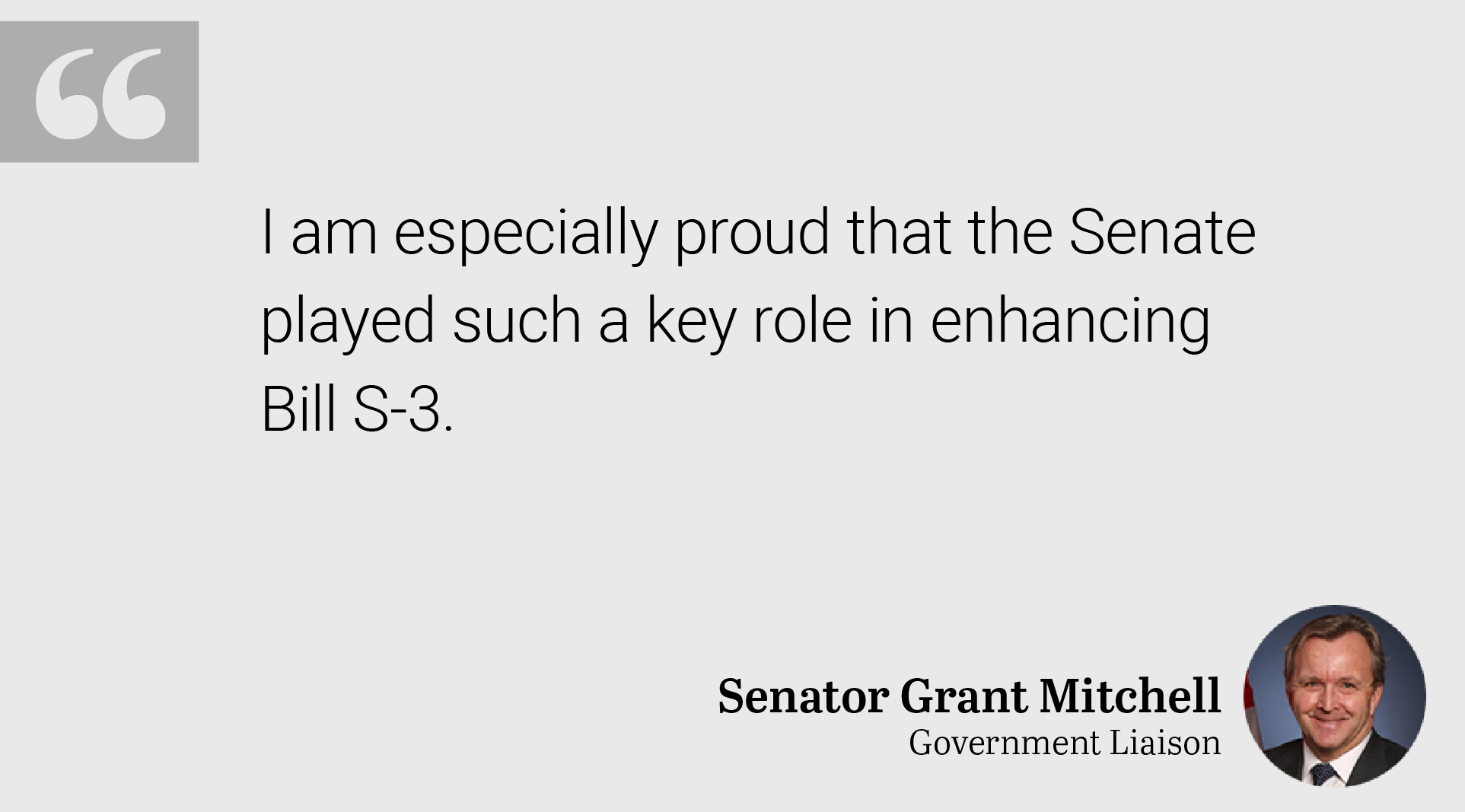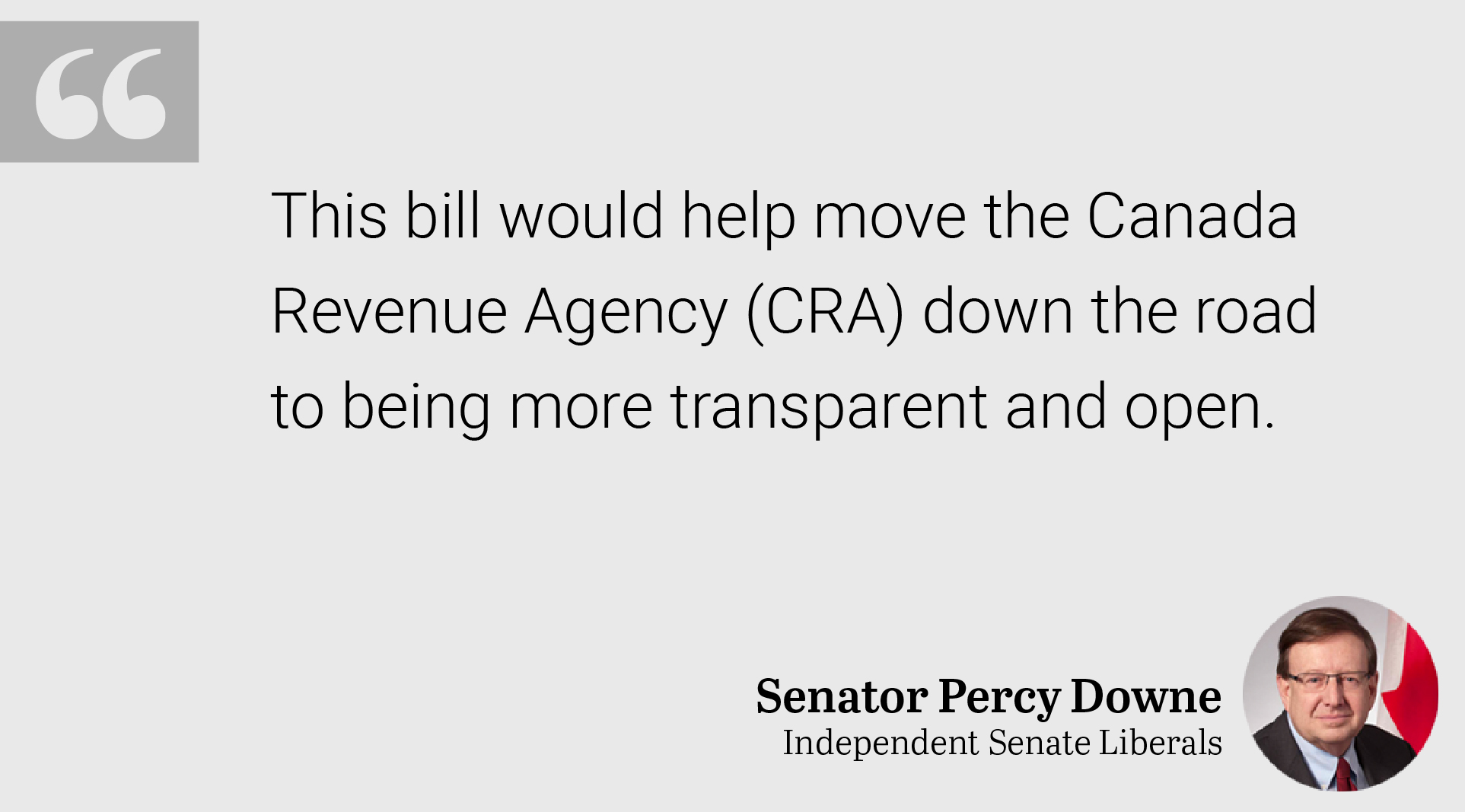Perspectives — November 28-30, 2017

Tags
Last week at the Senate: one Senate bill eliminating sex-based inequities in the Indian Act passes while another addressing tax evasion is debated, as the finance committee continues its study on the government’s small business tax proposal.

Government
Bill S-3, which seeks to eliminate sex-based inequities in the registration provisions of the Indian Act, was introduced in the Senate on October 25, 2016.
Now, just over one year later, thanks to the determined efforts of Senator Sandra Lovelace Nicholas, Senator Lillian Eva Dyck, and so many others who have been fighting for gender equality in the Indian Act registration for decades, this historic piece of legislation has become law.
Thanks to their efforts, the bill now proactively addresses further groups affected by residual sex-based discrimination, which were identified by the Indigenous Bar Association during the Senate committee hearings. Bill S-3 also now addresses the issue of unstated paternity by enshrining additional procedural protections in law.
I am pleased that our government is committed to working with First Nations, parliamentarians, affected individuals, and experts to ensure all sex-based discrimination is eliminated from registration provisions in the Indian Act. Furthermore, I am especially proud that the Senate played such a key role in enhancing Bill S-3.
For its efforts, the Senate has been recognized by the Hon. Carolyn Bennett, Minister of Crown-Indigenous Relations and Northern Affairs, for its diligence and willingness to work with the government and across party and caucus lines to strengthen Bill S-3.
Minister Bennett cited the fact that the government worked closely with the Standing Senate Committee on Aboriginal Peoples and many other senators on numerous amendments to the original version of Bill S-3, and that these amendments have greatly improved this legislation.
Opposition
The Parliamentary Budget Officer (PBO) released a report entitled Analysis of Changes to the Taxation of Corporate Passive Investment Income, which confirms the Finance Minister’s assault targets Canadian small businesses. The report found that a 15% tax hike is being introduced on a sector that drives local economies. And those caught paying the tab, says the PBO, are community leaders in small businesses throughout Canada.
Insurance brokers, financial advisors, real estate agents, small business management consultants, veterinarians, small town lawyers, doctors, dentists etc., will all pay more tax to cover the cost of this Liberal tax grab.
These people are not looking to get rich, rather at satisfying basic needs, sending their children to school, or expanding their business to create jobs. These are not people with hidden cash in offshore bank accounts or forgotten villas in France, and the hypocrisy is not lost on them.
Last week, the Senate Committee on National Finance concluded a series of public hearings across Canada on this tax reform. They heard from many small businesses and entrepreneurs who expressed concerns and confirmed that the government has brought forward complex tax changes which will hurt small businesses and drown them in red tape.
The committee is continuing its comprehensive study of these tax changes. Findings to date relate to the information uncovered in the recent PBO report that the Finance Minister is targeting small businesses throughout Canada.
The Senate Conservative Caucus will continue to fight unfair tax hikes every step of the way.
Senate Liberals
My bill, S-243 (the Fairness for All Canadian Taxpayers Act), amends the Canada Revenue Agency Act to require the Canada Revenue Agency (CRA) to report on all convictions for tax evasion, including a separate report listing all convictions for overseas tax evasion, in an annual report tabled in Parliament. As well, it would require the Minister of National Revenue to report to Parliament yearly on the “tax gap”, the difference between what taxes should have been collected and what is actually collected.
The bill would also require the CRA to provide the Parliamentary Budget Officer (PBO) with the data it has collected on the tax gap, as well as any additional data the PBO considers relevant to the PBO’s own independent analysis of the tax gap.
The reason that my bill would require the Canada Revenue Agency (CRA) to send the information on their tax gap analysis to the PBO is that quite simply, given the CRAs’ recent track record, Canadians can’t trust them. It’s a strong statement, but they have a track record that causes concern. There are many hard-working, conscientious employees at CRA. But it must be very discouraging to have a management team that operates the way it does.
This bill is not a silver bullet, but it would help move the CRA down the road to being more transparent and open. Canadians would then understand the size of the tax gap problem, the resources we need and what we can do to collect the money.
Last week at the Senate: one Senate bill eliminating sex-based inequities in the Indian Act passes while another addressing tax evasion is debated, as the finance committee continues its study on the government’s small business tax proposal.

Government
Bill S-3, which seeks to eliminate sex-based inequities in the registration provisions of the Indian Act, was introduced in the Senate on October 25, 2016.
Now, just over one year later, thanks to the determined efforts of Senator Sandra Lovelace Nicholas, Senator Lillian Eva Dyck, and so many others who have been fighting for gender equality in the Indian Act registration for decades, this historic piece of legislation has become law.
Thanks to their efforts, the bill now proactively addresses further groups affected by residual sex-based discrimination, which were identified by the Indigenous Bar Association during the Senate committee hearings. Bill S-3 also now addresses the issue of unstated paternity by enshrining additional procedural protections in law.
I am pleased that our government is committed to working with First Nations, parliamentarians, affected individuals, and experts to ensure all sex-based discrimination is eliminated from registration provisions in the Indian Act. Furthermore, I am especially proud that the Senate played such a key role in enhancing Bill S-3.
For its efforts, the Senate has been recognized by the Hon. Carolyn Bennett, Minister of Crown-Indigenous Relations and Northern Affairs, for its diligence and willingness to work with the government and across party and caucus lines to strengthen Bill S-3.
Minister Bennett cited the fact that the government worked closely with the Standing Senate Committee on Aboriginal Peoples and many other senators on numerous amendments to the original version of Bill S-3, and that these amendments have greatly improved this legislation.
Opposition
The Parliamentary Budget Officer (PBO) released a report entitled Analysis of Changes to the Taxation of Corporate Passive Investment Income, which confirms the Finance Minister’s assault targets Canadian small businesses. The report found that a 15% tax hike is being introduced on a sector that drives local economies. And those caught paying the tab, says the PBO, are community leaders in small businesses throughout Canada.
Insurance brokers, financial advisors, real estate agents, small business management consultants, veterinarians, small town lawyers, doctors, dentists etc., will all pay more tax to cover the cost of this Liberal tax grab.
These people are not looking to get rich, rather at satisfying basic needs, sending their children to school, or expanding their business to create jobs. These are not people with hidden cash in offshore bank accounts or forgotten villas in France, and the hypocrisy is not lost on them.
Last week, the Senate Committee on National Finance concluded a series of public hearings across Canada on this tax reform. They heard from many small businesses and entrepreneurs who expressed concerns and confirmed that the government has brought forward complex tax changes which will hurt small businesses and drown them in red tape.
The committee is continuing its comprehensive study of these tax changes. Findings to date relate to the information uncovered in the recent PBO report that the Finance Minister is targeting small businesses throughout Canada.
The Senate Conservative Caucus will continue to fight unfair tax hikes every step of the way.
Senate Liberals
My bill, S-243 (the Fairness for All Canadian Taxpayers Act), amends the Canada Revenue Agency Act to require the Canada Revenue Agency (CRA) to report on all convictions for tax evasion, including a separate report listing all convictions for overseas tax evasion, in an annual report tabled in Parliament. As well, it would require the Minister of National Revenue to report to Parliament yearly on the “tax gap”, the difference between what taxes should have been collected and what is actually collected.
The bill would also require the CRA to provide the Parliamentary Budget Officer (PBO) with the data it has collected on the tax gap, as well as any additional data the PBO considers relevant to the PBO’s own independent analysis of the tax gap.
The reason that my bill would require the Canada Revenue Agency (CRA) to send the information on their tax gap analysis to the PBO is that quite simply, given the CRAs’ recent track record, Canadians can’t trust them. It’s a strong statement, but they have a track record that causes concern. There are many hard-working, conscientious employees at CRA. But it must be very discouraging to have a management team that operates the way it does.
This bill is not a silver bullet, but it would help move the CRA down the road to being more transparent and open. Canadians would then understand the size of the tax gap problem, the resources we need and what we can do to collect the money.




